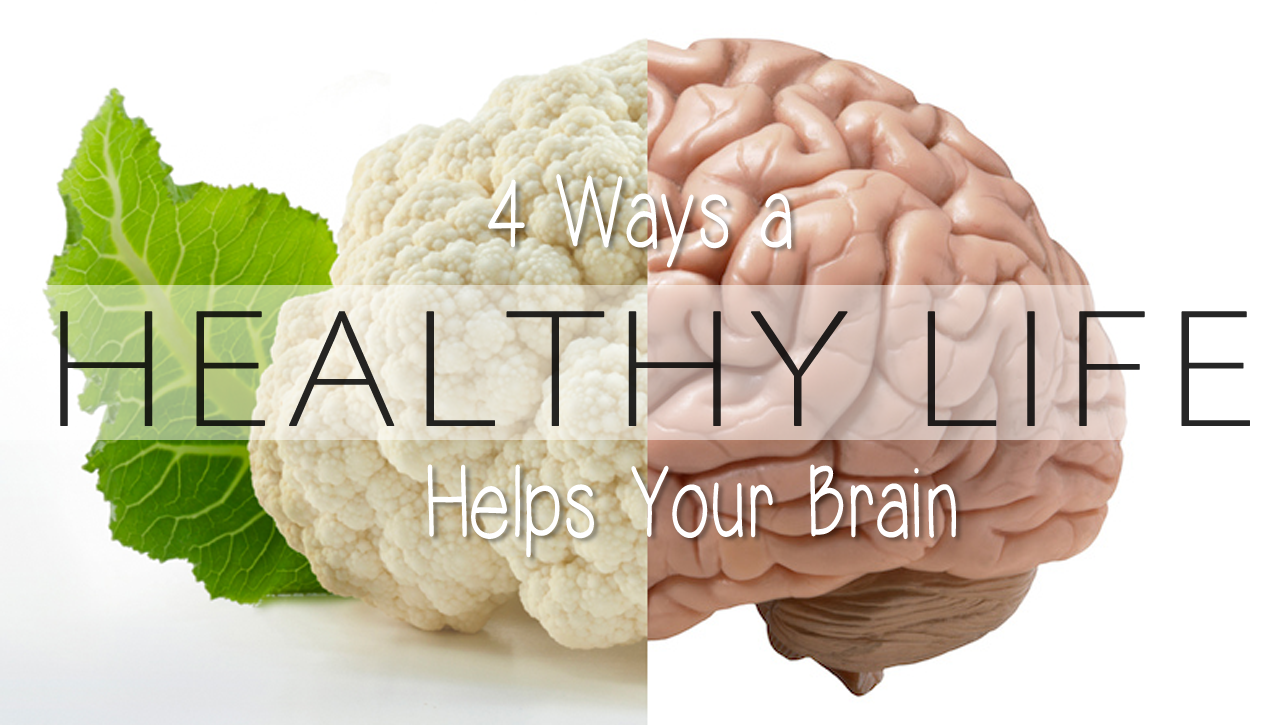
4 Ways a Healthy Lifestyle Helps Your Brain

Everyone knows that a healthy lifestyle is good for your body, helping to prevent chronic conditions like diabetes and heart disease. But few people have the same awareness of the benefits of healthy lifestyle habits on your brain, which, after all, is a vital organ, too.
Your brain only weighs about three pounds or approximately two percent of your total body weight, yet it’s responsible for coordinating virtually every critical body function. Accordingly, your brain also requires a substantial portion of your total resources to function, using up 20% to 30% of the total calories you consume. Surprisingly, despite its amazing functionality and resource demands, your brain is comprised of mostly water – about 80%, in fact, yet it contains an estimated 100 billion nerve cells. Here are just a few ways your healthy lifestyle is good for your brain.

1. Your nutrient-rich diet is as good for your brain as it is your body.
A diet rich in fresh fruits and vegetables, especially brightly colored fruits and bright or dark green vegetables, can reduce your risk of developing Alzheimer’s disease and contribute to better cognitive functioning.
If you consume a diet rich in Omega-3 fatty acids (oily fish is great for Omega-3s), you’re doing your brain a huge favor. Omega-3 fatty acids have been shown to reduce brain inflammation and contribute to the growth of new brain cells, while also reduces your risk of Alzheimer’s disease and dementia.

2. Physical activity isn’t just for losing weight, but for brain health, too.
Exercise, combined with a balanced, healthy diet, is widely regarded as the most effective way to lose weight and become more physically fit. But physical fitness offers ample brain benefits, as well, such as lowering your risk of cognitive decline and lessening symptoms of certain cognitive disorders.
According to the Alzheimer’s Association, physical activity that increases your heart rate increases blood flow to your brain, “providing additional nourishment while reducing potential dementia risk factors such as high blood pressure, diabetes and high cholesterol.”

3. Healthy sleeping habits boost brain function and preserve brain health.
According to the National Institute of Neurological Disorders and Stroke, “Many studies make it clear that sleep deprivation is dangerous. Sleep-deprived people who are tested by using a driving simulator or by performing a hand-eye coordination task perform as badly as or worse than those who are intoxicated.”
The NINDS also points out that caffeine and other stimulants are not a suitable substitute for sleep deprivation, and in fact don’t overcome the effects of a lack of sleep. Sleep is necessary for survival and is critical for the functioning of the nervous system. It’s believed that sleep offers neurons a chance to repair and recharge, enabling the brain to make sharper, better connections while we’re awake, offering mental clarity. Additionally, sleep boosts memory, improves learning, helps us synthesize new ideas, and scientists now even believe it may be possible to learn new information while asleep.

4. Mental and social stimulation are good for your soul (and the health of your brain).
Social isolation leads to depression and anxiety, which create stress and contribute to negative impacts on your overall health and well-being. Conversely, an active social life (especially with a four-legged companion by your side!) and lifelong mental stimulation are the recipe for strong brain health throughout life.
Dr. Gary Small, director of the UCLA Longevity Center at the Semel Institute for Neuroscience and Human Behavior and the Parlow-Solomon Professor on Aging at the David Geffen School of Medicine, studied the effects of mental stimulation by measuring brain activity while participants performed Google searches.
“Small used imaging techniques to demonstrate that while an older person is searching online, the brain shows a significant increase in neural activity,” explains an article from UCLA about Small’s research. “Other studies by Small’s team have found that through memory training, the brain becomes more efficient — performing better even when there’s less neural activity.”
If you’re feeling like you’re satisfied with a sedentary or unhealthy lifestyle, perhaps because you’re not yet seeing any detrimental effects, it might be time to start taking brain health into consideration. A healthy diet, regular physical activity, socialization and mental stimulation, and adequate sleep are all excellent contributors to brain health and reduced risk of cognitive decline throughout aging.
:::
Images via Pixabay & MorgueFile





